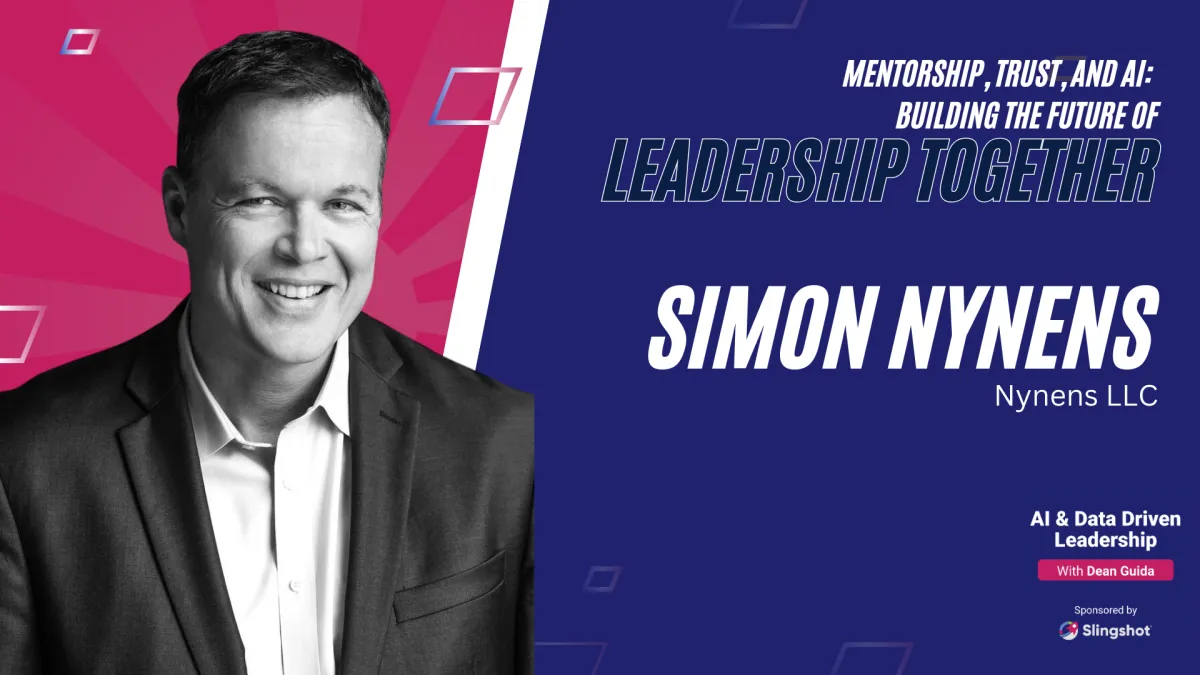Blog

11 - Mentorship, Trust, and AI: Building the Future of Leadership Together
Leadership Insights with Simon Nynens: Navigating AI, Intentionality, and Effective Leadership
In this episode of the AI & Data Driven Leadership Podcast, host Dean Guida sits down with Simon Nynens, CEO of Nynens LLC, to explore the evolving role of leadership in today’s technology-driven world. Simon shares his extensive experience in leadership, the impact of artificial intelligence (AI) on business strategy, and how intentional leadership can drive growth. His insights are invaluable for executives navigating the complexities of AI, communication, and business transformation.
The Role of AI in Leadership and Business Strategy
Simon discusses AI’s transformative potential across industries and its role in enhancing decision-making. While AI offers significant benefits, he emphasizes that it should complement human decision-making, not replace it. AI’s evolution will require a long-term, collaborative approach between human leaders and AI systems. He also addresses concerns about job displacement, emphasizing that AI will enhance roles rather than eliminate them.
Leaders, Simon believes, must find the balance between driving innovation and exercising caution when integrating AI into business strategies. AI is most powerful when it amplifies human capabilities, guiding teams with data-driven insights while maintaining the leadership skills that only humans can provide.
Intentional Leadership: Creating Purposeful Impact
Simon highlights the importance of intentionality in leadership. Leaders must set clear, purposeful goals and take time to reflect regularly on progress. He advocates for a mindset of gratitude, which can help foster well-being and positivity in the workplace. By focusing on what matters most, leaders can avoid distractions and keep teams aligned with long-term success.
Additionally, Simon emphasizes the value of open communication and feedback. Leaders must create an environment where team members feel safe sharing their thoughts and concerns. This not only builds trust but also fosters stronger relationships and better decision-making. Self-awareness also plays a key role in leadership, as understanding how leaders are perceived by their teams allows them to adjust their approach for better results.
Key Takeaways from the Episode
AI’s Role in Leadership: How AI can complement leadership decisions to enhance strategic outcomes.
Adapting to AI in the Workforce: The need for new skills and adaptability as AI transforms, not replaces, jobs.
Intentional Leadership: Setting clear goals and reflecting regularly to focus on purposeful leadership.
Open Communication: Creating a culture where feedback is valued to improve leadership effectiveness.
Self-Awareness: Understanding self-perception and adjusting leadership styles for better team dynamics.
This episode offers valuable insights into how AI is shaping leadership and the importance of being intentional in leading teams. Simon’s deep expertise in leadership and AI provides a roadmap for executives seeking to navigate the complexities of modern business leadership.
Want to Learn More?
Explore Slingshotapp.io: Discover how Slingshotapp.io empowers businesses to leverage data and AI for optimized operations and growth.
Apply to be a Podcast Guest: If you're an expert in AI, leadership, or technology, apply to be a guest on our podcast here.
Listen and Subscribe to the AI & Data Driven Leadership Podcast Now:
Say "Hey, Siri / Alexa. Play AI & Data Driven Leadership Podcast"
About The Host
Tech entrepreneur and CEO Dean Guida knows there’s a limit to what you can build with grit alone.
At sixteen, Dean bought the first IBM PC and fell in love with writing software. He went on to receive a Bachelor of Science degree in operation research from the University of Miami. After graduating, he was a freelance developer and wrote many systems for IBM and on Wall Street. At twenty-three, he started Infragistics to build UX/UI tools for professional software developers.
Seemingly overnight, Dean had to go from early internet coder to business operator—a feat that forced him to learn some of business’s biggest lessons on the job. He immediately began navigating the nuances of scaling a company, hiring and growing teams, and becoming a leader, a manager, and a mentor.
Fast-forward thirty-five years, and Dean’s tech company now has operations in six countries. More than two million developers use Infragistics software, and its client roster boasts 100 percent of the S&P 500, including Fidelity, Morgan Stanley, Exxon, Intuit, and Bank of America.

Media














